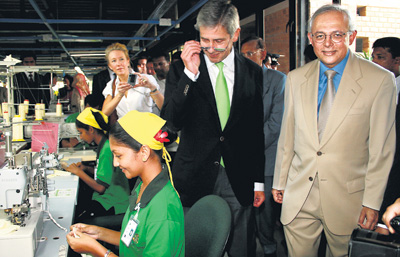
MAS Thurulie sets benchmark in ‘green’ lingerie manufacturing
The sprawling 150-acre MAS fabric complex in Thulhiriya, close to Warakapola, received a new addition recently in the form of a carbon-neutral lingerie manufacturing plant. The MAS Intimates Thurulie plant will manufacture lingerie for UK-based Marks and Spencer, for which MAS is a chief vendor. The plant was opened last week by Sir Stuart Rose, CEO of Marks and Spencer on his first visit to the island. The $7 million investment by MAS is in tune with the Sterling Pound 200 million “Plan A” scheme conceptualized by Marks and Spencer and spearheaded by Sir Rose himself. Plan A aims at changing all of Marks and Spencer operations worldwide to be completely carbon neutral and using sustainable sources and processes. “Building the world’s first eco-plant for lingerie was difficult because there were no signposts,” said Dian Gomes, Managing Director of MAS Intimates, explaining that MAS was the first of M and S’s suppliers to sign on to the Plan A initiative and thus had the task of implementing fresh designs for a plant of its nature. Gomes went on to say that the Thurulie plant had been built at an accelerated timeline of seven months to keep with Sir Stuart’s arrival in the island, and was confident that it would put Sri Lanka on the map for sustainable management. “The apparel industry, often maligned, has taken the leadership in sustainable management,” he said. Eco-happy environment On the green front, the plant looks the part with its clay walls, cement stairways and verdant greenery. However, the carbon-friendly environment has been instilled on a more subtle level as well. Some 10% of the power consumed at Thurulie will be coming from what Gomes called “the largest solar panel installation in Sri Lanka so far” which in turn has been funded by Marks and Spencer. The remaining 90% will be from a mini-hydro power plant in Deniyaya, through the national grid. Also, the plant will consume only 40% of water than a plant of similar capacity would use. Individual switchblade lighting using energy saving light bulbs and extensive daylight usage has been incorporated within the factory. While the former enables workers to switch on lights only when they are required as against joint lighting commonly used in factories, the latter is in the design of the building, allowing maximum sunlight into the factory via wide windows sans any glare. Replacing air conditioning, the interior of the factory is cooled through ‘Evaporative cooling’, a method which blows air through a stream of cool water back and forth, cooling it. The walls are lines with “eco-bricks” instead of cement and plaster. These contain only 10% of cement and contribute to the cause especially because they are not kiln-burnt in the traditional method. Many of the processes are built along eco-lines and Thurulie will be managed on the Lean Management plan made famous by Toyota though the MAS Operating Systems (MOS). Call for ‘green’ garments MAS Holdings Chairman Mahesh Amalean told The Sunday Times FT that the plant was a result of the global awakening towards climate change. “Especially young people are looking for eco-friendly goods,” he said, adding that the demand for such goods was increasing gradually over time. The garment manufactured at Thurulie and exported will have tags that say they were made in a carbon-neutral factory. He was unable to say if the goods would also have a higher price attached to them. Amalean revealed that the other MAS plants are also to be converted to ‘green’ over the next few years. Sir Stuart expressed his delight with the factory saying that it was “One of the best factories I have even seen” and added that Sri Lanka has the benefit of providing his firm with quality and high-standard garments without compromising those standards through unethical production methods. He went on to say that his pet ‘Plan A’ project had already made progress, since 85 of the 100 points listed in its agenda have already been addressed. Speaking about the GSP + provision from the EU that Sri Lanka is angling to retain amidst many issues, he said, “We in our small way will do our best to support you in your application this year.” GSP+ not a give away- Amunugama The GSP + concession that Sri Lanka currently enjoys from the EU is a result of the high standards of the country’s apparel industry, said Sarath Amunugama, Minister of Enterprise Development and Investment Promotion, speaking at the opening of the new MAS Intimates eco-friendly lingerie manufacturing plant, MAS Intimates Thurulie. “The GSP+ that we enjoy now is not a giveaway, it is an award for excellent management in the apparel sector,” said Amunugama. He noted that the apparel sector had seen an seven percent growth in 2007 and expressed his hope that apparel manufacturers MAS Holdings would “fuel the upward trajectory of the development plan”. Amunugama also requested the help of Sir Stuart Rose, CEO of Marks and Spencer who is visiting the island and was present at the occasion, on the retaining the concession. “We have a strong relationship with them (Marks and Spencer) and speak the language,” he said. |
|
||||||
|
||||||
| || Front
Page | News
| Editorial
| Columns
| Sports
| Plus
| Financial
Times | International
| Mirror
| TV
Times | Funday Times || |
| |
Reproduction of articles permitted when used without any alterations to contents and a link to the source page.
|
© Copyright
2008 | Wijeya
Newspapers Ltd.Colombo. Sri Lanka. All Rights Reserved. |
